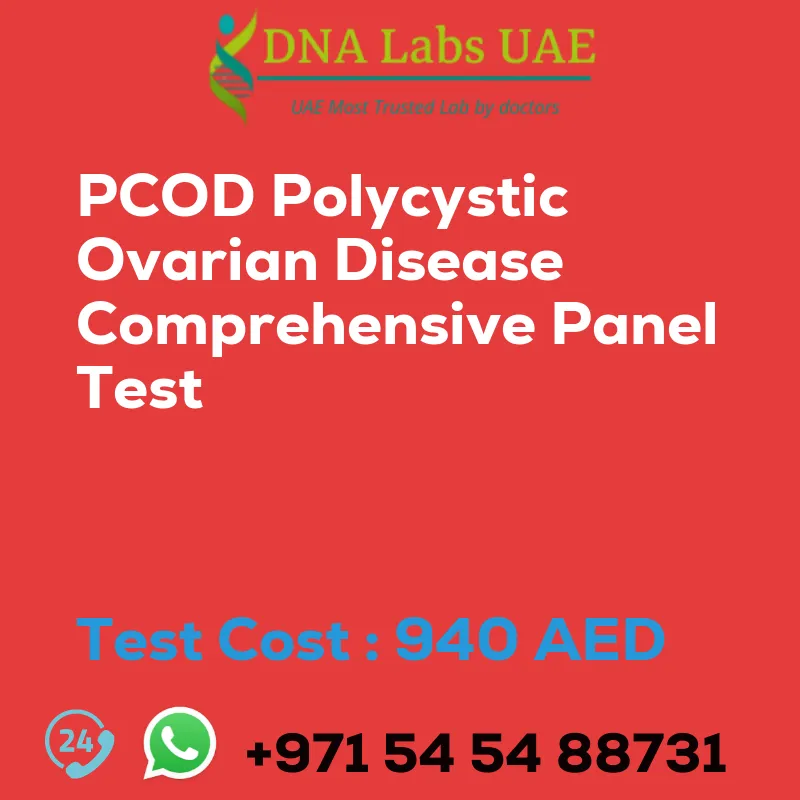PCOD POLYCYSTIC OVARIAN DISEASE COMPREHENSIVE PANEL Test
Test Cost: AED 940.0
Symptoms, Diagnosis, and Test Details
The PCOD (Polycystic Ovarian Disease) Comprehensive Panel is a series of tests conducted to diagnose and monitor the condition of Polycystic Ovarian Syndrome (PCOS) or Polycystic Ovarian Disease (PCOD). PCOS is a hormonal disorder that affects women of reproductive age, causing irregular periods, excessive hair growth, acne, and infertility.
The comprehensive panel typically includes the following tests:
- Hormone Panel: This test measures the levels of various hormones such as follicle-stimulating hormone (FSH), luteinizing hormone (LH), estrogen, progesterone, and testosterone. These hormones play a crucial role in regulating the menstrual cycle and fertility.
- Glucose Tolerance Test: This test evaluates how well the body processes sugar (glucose). It helps determine if the patient has insulin resistance, a common condition associated with PCOS.
- Lipid Profile: This test measures the levels of cholesterol and triglycerides in the blood. Women with PCOS are at a higher risk of developing high cholesterol levels and other cardiovascular problems.
- Thyroid Function Tests: This includes tests to measure the levels of thyroid-stimulating hormone (TSH), free thyroxine (T4), and free triiodothyronine (T3). PCOS can be associated with thyroid disorders, which can further affect hormone levels and menstrual irregularities.
- Anti-Mullerian Hormone (AMH): This test measures the levels of AMH, a hormone produced by the ovaries. Elevated levels of AMH are commonly seen in women with PCOS and can indicate the presence of multiple small cysts in the ovaries.
- Pelvic Ultrasound: Although not a blood test, a pelvic ultrasound may also be included in the comprehensive panel. It helps visualize the ovaries and assess their size, shape, and the presence of any cysts.
The results of these tests help healthcare providers diagnose PCOS and determine the appropriate treatment plan. The panel provides a comprehensive overview of hormonal imbalances, insulin resistance, lipid abnormalities, and other associated conditions. It also helps monitor the effectiveness of treatment and make adjustments as needed.
Test Price: AED 940.0
Sample Condition
2 mL (1 mL min.) plasma from 1 Gray Top (Sodium Fluoride) tube and 4 mL (2 mL min.) serum from 1 SST. Ship refrigerated or frozen. Overnight fasting is mandatory. Collect specimen 4 hours after the patient has awakened.
Report Delivery
Sample daily by 4 pm; Report same day
Method
Hexokinase, CMIA, CLIA, Spectrophotometry
Test Type
PCOD
Doctor
Gynecologist
Test Department
Pre Test Information: Overnight fasting is mandatory. Collect specimen 4 hours after the patient has awakened.
| Test Name | PCOD POLYCYSTIC OVARIAN DISEASE COMPREHENSIVE PANEL Test |
|---|---|
| Components | *FSH*LH*Testosterone, Total *Prolactin *Insulin,fasting*Glucose,fasting * TSH Ultrasensitive*DHEAS*AMH*Lipid Profile, Screen*HOMA-IR |
| Price | 940.0 AED |
| Sample Condition | 2 mL (1 mL min.) plasmafrom1 Gray Top (Sodium Fluoride) tubeAND 4 mL (2 mL min.) serum from 1 SST. Ship refrigerated or frozen. Overnight fasting is mandatory. Collectspecimen4hours after the patient has awakened. |
| Report Delivery | Sample Daily by 4 pm; Report Same day |
| Method | Hexokinase, CMIA, CLIA,Spectrophotometry |
| Test type | PCOD |
| Doctor | Gynecologist |
| Test Department: | |
| Pre Test Information | Overnight fasting is mandatory. Collect specimen 4 hours after the patient has awakened. |
| Test Details |
The PCOD (Polycystic Ovarian Disease) Comprehensive Panel is a series of tests conducted to diagnose and monitor the condition of Polycystic Ovarian Syndrome (PCOS) or Polycystic Ovarian Disease (PCOD). PCOS is a hormonal disorder that affects women of reproductive age, causing irregular periods, excessive hair growth, acne, and infertility. The comprehensive panel typically includes the following tests: 1. Hormone Panel: This test measures the levels of various hormones such as follicle-stimulating hormone (FSH), luteinizing hormone (LH), estrogen, progesterone, and testosterone. These hormones play a crucial role in regulating the menstrual cycle and fertility. 2. Glucose Tolerance Test: This test evaluates how well the body processes sugar (glucose). It helps determine if the patient has insulin resistance, a common condition associated with PCOS. 3. Lipid Profile: This test measures the levels of cholesterol and triglycerides in the blood. Women with PCOS are at a higher risk of developing high cholesterol levels and other cardiovascular problems. 4. Thyroid Function Tests: This includes tests to measure the levels of thyroid-stimulating hormone (TSH), free thyroxine (T4), and free triiodothyronine (T3). PCOS can be associated with thyroid disorders, which can further affect hormone levels and menstrual irregularities. 5. Anti-Mullerian Hormone (AMH): This test measures the levels of AMH, a hormone produced by the ovaries. Elevated levels of AMH are commonly seen in women with PCOS and can indicate the presence of multiple small cysts in the ovaries. 6. Pelvic Ultrasound: Although not a blood test, a pelvic ultrasound may also be included in the comprehensive panel. It helps visualize the ovaries and assess their size, shape, and the presence of any cysts. The results of these tests help healthcare providers diagnose PCOS and determine the appropriate treatment plan. The panel provides a comprehensive overview of hormonal imbalances, insulin resistance, lipid abnormalities, and other associated conditions. It also helps monitor the effectiveness of treatment and make adjustments as needed. |








